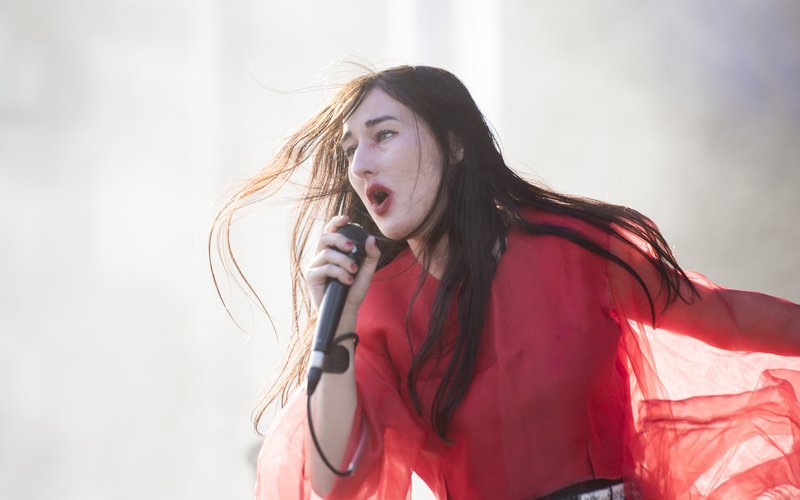
KEXP's Sound & Vision airs every Saturday morning from 7-9 AM PT, featuring interviews, artistry, commentary, insight, and conversation to that tell broader stories through music, and illustrate why music and art matter. You can also hear more stories in the new Sound & Vision Podcast. New episodes are out every Tuesday. Subscribe now.
It all started when Amazon Web Service announced its first music festival, called Intersect. Since then, more than a thousand musicians have signed a pledge, organized in part by Fight for the Future, called “No Music for ICE.” The musicians who signed the pledge say they will not participate in Amazon sponsored events or partner with Amazon in any way unless the company terminates existing contracts with military, law enforcement, and government agencies such as ICE, stops providing cloud services and tools to organizations that deport people from the US, and end projects that encourage racial profiling and discrimination, such as Amazon’s facial recognition products.
Zola Jesus is one artist who signed the pledge. She says she wanted to be part of change, but she also realizes this could be a financial risk. A big way she makes money as a musician is having her songs placed in film and TV shows. Her songs have appeared in shows such as Grey’s Anatomy and How to Get Away with Murder.
“That is actually one of the only ways that I can make money when I’m not touring,” she says. “That’s one of the only income streams for a musician these days.”
She says by signing this pledge, she’s cutting herself off from future opportunities to have her music placed in productions by Amazon Studios.
“A lot of people put my music in their shows and stuff, and in the past, I never really was critical about well, who’s making this show? Who's producing it? Where is it premiering? Who has the rights to it? But now, I have to be more aware of that – like, is this an Amazon Studios production? I’m not going to work with them if it is,” she says.
Julia Shapiro of Chastity Belt also signed the pledge. She says her band has never played at an Amazon sponsored event before, but she has friends who’ve played Amazon parties before.
“It’s tough because we’re just trying to make money as artists – which is really hard. And Amazon is this local – “local” – business that has all this money so, yeah, I can see how smaller artists could get sucked into it,” says Shapiro.
She says she’d like to see more mainstream artists sign the pledge. As it stands now, it’s mostly indie artists who’ve signed it. “I got in some stupid Twitter fights with people who responded to the petition by being like, oh, like I care – never heard of these artists,” she says.
Daniel Salas says his band Versing also signed the pledge. He thinks indie artists have a little more freedom to sign the pledge compared to major acts.
“I think it’s because indie bands are less closely managed,” says Salas. “I’m sure a lot of band managers are telling the bands they manage, don’t sign this. Don’t do this. Labels are probably not going to be okay with their artists doing this. The more control you have over, basically, people whose priorities is profits – I mean, that’s really what it always comes down to. So, I think for bigger artists, there’s a lot more at stake financially.”
Salas and his band members also have day jobs. They don’t rely on their music to be their only source of income.
“We’re such small fish I don’t think it’s going to hinder us too much,” says Salas. “At the end of the day, it’s an easy decision because my priorities are not necessarily to do whatever it takes to make money with my band.” Salas says he doesn’t think his band hasn’t played for any Amazon sponsored events, at least that he knows of. He says it’s can be hard to tell when it comes to festivals, if large companies helped sponsor it.
“Basically, part of the problem is that there’s not a lot of transparency with who is putting on events,” he says. “These big festivals, they obviously require a lot of money to put on and you know you’re going to have some, a lot of times, larger corporations are going to be funding them. And, you know, I think the events need to be a little bit more upfront with who they’re working with. Because some of the artists were surprised that this was a big Amazon event. They’re not leading with that a lot of the time.”
But Salas doesn’t expect Amazon to change the way they do business anytime soon.
“The pledge is more a way for artists to express solidarity with one another while trying to take a stance than it is a realistic way of forcing Amazon to change its behavior. I don’t expect that they’re going to see this pledge and change anything,” he says.
The Amazon Web Servies Music Festival Intersect features artists such as Beck, Foo Fighters, Kasey Musgraves, and Spoon. KEXP reached out to other festival performers such as Weyes Blood, Japanese Breakfast, and Brandi Carlile for comment on the festival and “No Music for ICE" pledge but did not hear back. Amazon and AWS also did not respond to requests for comment.
A study from USC’s Annenberg School of Communication and Journalism found the ratio of male to female music producers is 49 to 1.
In this month's edition of Throwaway Style, Daniel Salas of local band Versing gives us a track-by-track report on the band's debut full-length, 10000.
She's also shared the record's lead single "Natural"